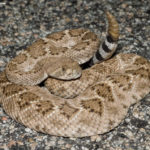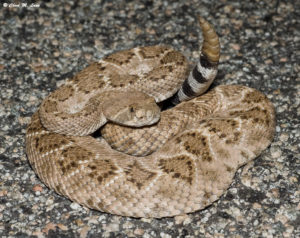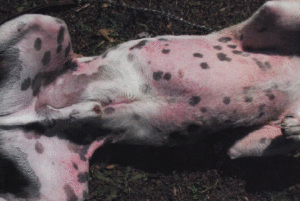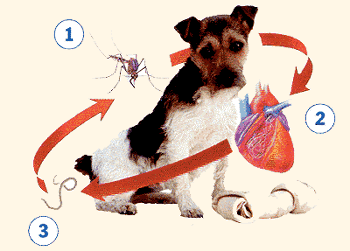
About Heartworm Disease
Heartworm disease in dogs and cats is caused by Dirofilaria immitis. Infective larvae, or “baby” heartworms, are transmitted through a mosquito’s bite. Once in the host animal, baby heartworms mature into adults in the heart and major vessels of the lungs, where they cause inflammation, heart disease, respiratory difficulties, and even death.
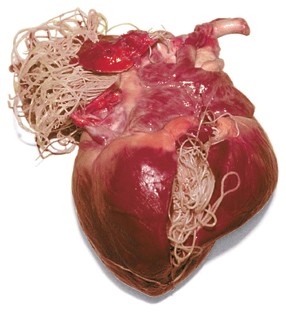
Some facts about heartworm disease:
- Heartworms can live 5 to 7 years in the dog
- The average female heartworm is 10 – 12 inches long!
- Heartworm disease is most common along the Atlantic and Gulf Coasts but has been reported in all 50 states
- Untreated heartworm disease can cause heart, lung, liver, and kidney damage
- Humans cannot catch heartworm disease from their pets
Symptoms of heartworm disease include:
- Shortness of breath
- Exercise intolerance
- Chronic cough
- Weight loss
- Lethargy
- Progression to congestive heart failure
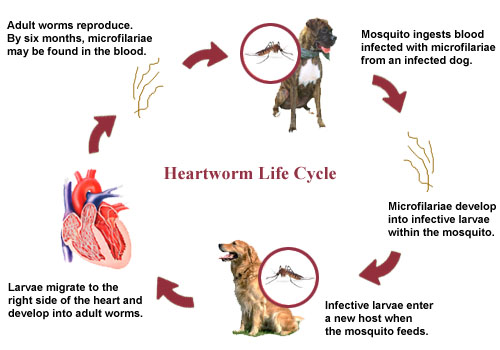
Heartworm disease is often diagnosed by a simple blood test, which is run in our office in about 10 minutes. Supporting evidence of heartworm disease may also include clinical signs, blood work, and x-rays.
How Preventatives Work
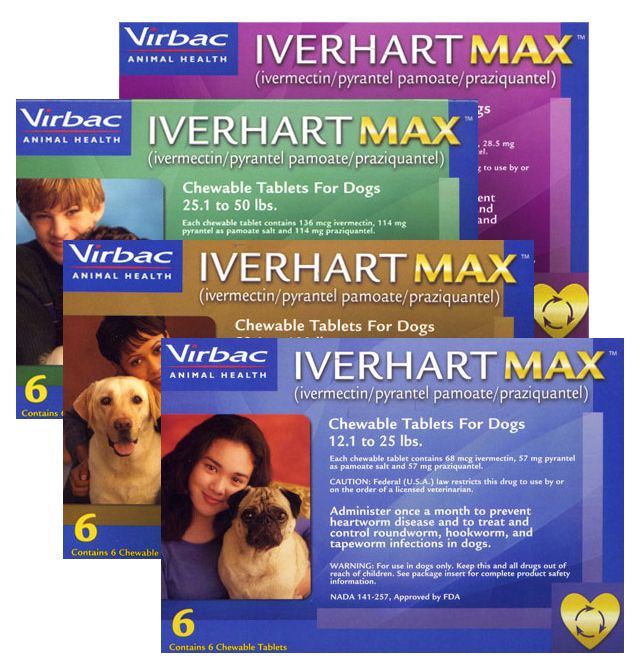
Monthly heartworm preventatives work by killing these baby heartworms if and when they enter the bloodstream, keeping them from being able to grow into adults.
Preventatives do not kill adult heartworms. Heartworm treatment (for adult worms) includes multiple painful injections of an arsenic-based medication. Heartworm treatment can have dangerous consequences as adult worms begin to die. Dying worms can cause dangerous inflammatory responses, and can lead to blood clots lodging in vessels, causing severe complications and even death. Heartworm treatment often requires hospitalization, and is very expensive.
Additional benefits of heartworm preventatives:
Many heartworm preventatives also contain medications to control minor infestations of certain intestinal parasites, including hookworms, roundworms, and tapeworms. Dogs are commonly exposed to these parasites through infected feces, contaminated grass and soil, and even through insects and other pests which may find their way indoors.
Year-Round Protection is Key
Because our warmer climate can be amenable to mosquitoes even in the middle of winter, heartworm preventatives should be given year round. The use of heartworm preventatives only during the summer months is no longer recommended.
Although cats are less susceptible to heartworm infection, it does occur. Heartworm disease in cats causes severe respiratory symptoms and currently there is no approved treatment for heartworm disease in cats. Thus, heartworm preventatives are also recommended year round in cats.
Ask Us About Heartworm Prevention
As with many diseases in animals, the best treatment is prevention. Ask our veterinarians at Advanced Veterinary Care which heartworm preventative would be best for your pet, and protect your best friend from this deadly disease.
For more information about heartworm disease, visit the American Heartworm Society’s website.


